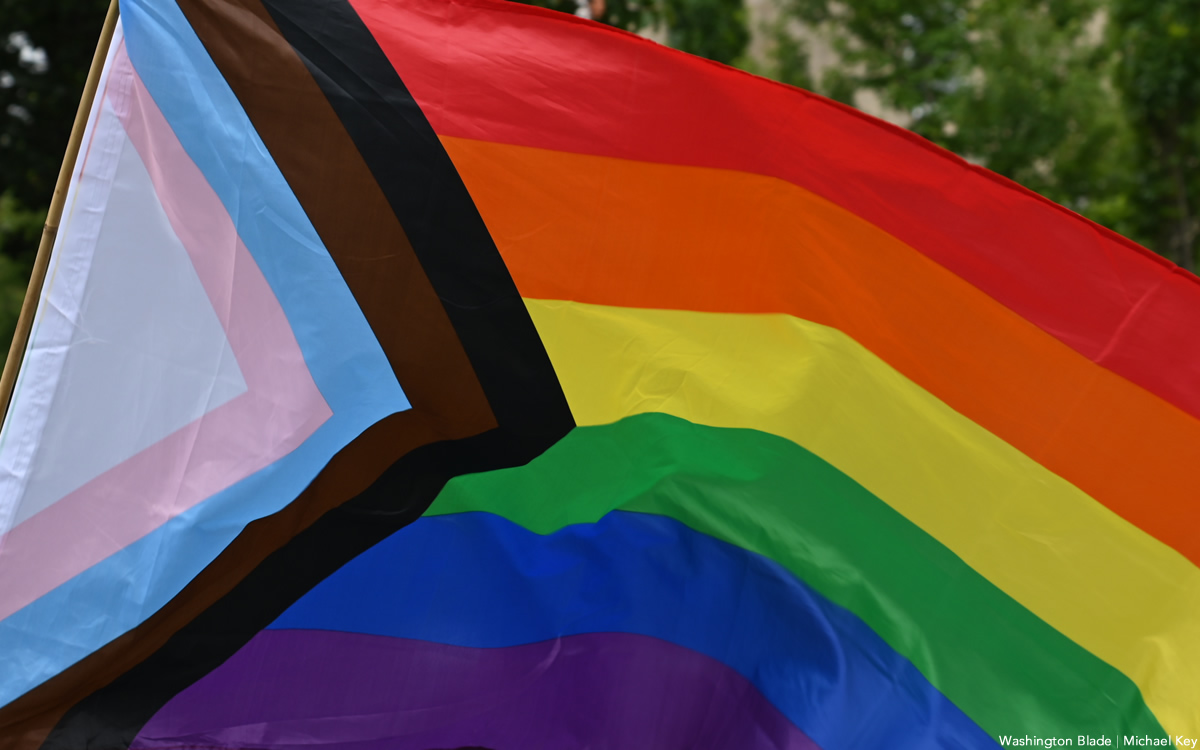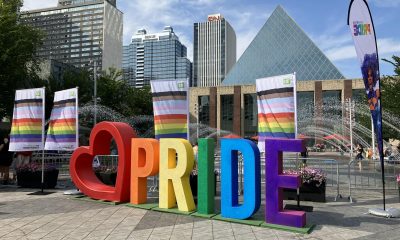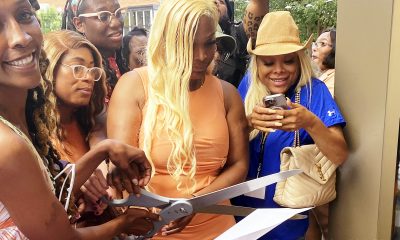Commentary
BookMen DC: Still going strong at 25
Celebrating the longest-running LGBTQ literary group in the area

On May 11, 1999, what was originally known as the Potomac Gay Men’s Book Group convened for its first meeting. A lot has changed over the ensuing quarter-century, starting with our name. But our identity remains true to the description on our blog: “an informal group of men who are interested in gay literature (both fiction and non-fiction).”
Our founder, Bill Malone, worked at the Whitman-Walker Clinic and started the group using donations of remainder books from a wholesaler in New York. Soon after that, members decided to get their own books, and began purchasing them through Lambda Rising, which offered a discount for such orders until it closed in 2010. The group later renamed itself BoysnBooks, and then became BookMen DC in 2007, which is also when we started our blog.
Following Bill’s tenure, Tom Wischer, Greg Farber and Tim Walton (who set up our blog) have served as our facilitators. I succeeded Tim in that role in 2009, and am grateful to him and all my predecessors for laying such a solid foundation for our group.
Twenty-five years after our founding, we are the longest-running LGBTQ literary group in the DMV. So far, we have discussed nearly 400 books, ranging from classics like Plato’s Symposium to graphic novels, gay history and memoirs, and novels by James Baldwin, Michael Cunningham, E.M. Forster and Edmund White—to name just a few of the many authors and genres we’ve explored.
Currently, we have more than 120 names on our mailing list, of whom about a quarter attend meetings at least occasionally. (Average attendance at our meetings is about 10.) Our members variously consider themselves gay, queer, bisexual, or transgender, and those varying perspectives enhance our discussions. I would be remiss if I didn’t acknowledge that, like many LGBTQ organizations, we are not nearly as diverse as I wish we were. Although we do have young members and people of color within our ranks, we are predominantly white and middle-aged or older. We have tried various forms of outreach to further diversify our membership, and will keep working on that.
How has BookMen DC not just survived, but thrived, when so many other book clubs and LGBTQ groups have foundered? I would identify several factors.
First and foremost, we are welcoming. We have no minimum attendance requirements and charge no dues. And we expressly encourage members to join us at meetings even if they haven’t finished the selection we’re discussing.
We are also collaborative. Each fall, members nominate titles for the next year’s reading list; I then compile those suggestions into a list for members to weigh in on, and the results of that vote determine what we will read.
Finally, we are flexible and adaptable. Over the years, we have met in locations all over the District. Currently, we meet on the first Wednesday of each month at the Cleveland Park Library (3310 Connecticut Ave. NW) from 6:30-7:30 p.m. to discuss entire books; afterward, those interested go to dinner at a neighborhood restaurant.
When the pandemic struck four years ago, we took a break for a couple of months before moving operations online. (Thank God for Zoom!) Even after the venues where we’d been meeting reopened, we have continued to meet virtually on the third Wednesday of each month, from 7-8 p.m. During those Zoom sessions, we discuss sections of anthologies of poetry and short stories, as well as short standalone works (e.g., plays and novellas).
If you enjoy LGBTQ literature and would like to try us out, visit our blog: https://bookmendc.blogspot.com/ and click the link to email me. We’d love to meet you!
Steven Alan Honley, a semi-retired musician, editor, and writer, has been a member of BookMen DC since 2000 and its facilitator since 2009.
Commentary
To comply or not to comply is not the question
Implementation of pro-LGBTQI+ rulings in Botswana and Namibia is unsatisfactory

Over the past five years, the highest courts in Namibia and Botswana have made significant decisions in favor of minority groups’ human rights through favorable judgments and court orders. However, the implementation of these orders related to the rights of LGBTQI+ in Botswana and Namibia has not been satisfactory so far.
In 2016, the Botswana Court of Appeal ordered the Registrar of Societies to register the Lesbians, Gays and Bisexuals of Botswana (LEGABIBO) after they had been denied registration based on the criminalization of same-sex sexual conduct. In 2017, the High Court of Botswana pronounced that denying a transgender man legal gender recognition undermines their dignity and humanity and ordered the Ministry of Home Affairs to change his identity documents from female to male. In 2021, the Court of Appeal in Botswana decriminalized consensual same-sex sexual conduct. In May 2023, the Supreme Court of Namibia ordered the government to recognize same-sex unions concluded outside Namibia, where same-sex marriages are legal in terms of the Immigration Act. While all these cases constitute landmark cases in securing and guaranteeing the rights of LGBTIQ persons, there is a growing trend of non-implementation when it comes to such judgements.
Government officials have partially or selectively implemented or completely disregarded the court decisions. In the LEGABIBO registration case, the Botswana Court of Appeal found that it is unconstitutional to deny registration under the assumption that LGBTQI+ are not recognized in the Bill of Rights and will offend the morality of the nation. The court found that LGBTQI+, like any other citizen or group of people in Botswana, have the right to freedom of association, expression and assembly, and issued an order for LEGABIBO to be registered, an order that was fulfilled promptly. However, seven years later, in March 2024, an LBQ group’s efforts to register are met with sentiments similar to those before the LEGABIBO jurisprudence. Senior public officials resisted the highest court decision to register this new group. Although their reasons are not stated as clearly as LEGABIBO rejection, government officials are still surreptitiously blocking the registration of LGBTQI+ organizations.
Similarly, we have observed the selective application technique unfolding in legal gender recognition cases. In this case, the government officials have interpreted this as a single order that only applies to the applicants and not “all persons.” According to anecdotal evidence based on the experiences of individuals who sought legal gender recognition, they are instructed to acquire individualized court orders, a complete misinterpretation of the court’s instructions, burdening the courts to issue duplicate orders. This selective interpretation is a covert move by government officials to undermine judicial decisions and transfer the responsibility and burden of implementation to resource-constrained individuals, limiting access to justice. What is also curious is why the court system does not address repeat applications on the same issue.
With the decriminalization court order, the attorney general acted in contempt of the judgment when he, instead of scrapping Sections 164 (a) and (c), blatantly ignored the court order and put a bill before parliament for debate. The highest court in Botswana had made a carefully considered decision to decriminalize, as indicated by a statement from SALC (Southern Africa Litigation Center) and by many contributors to this issue; there is no need to debate; the court has decided.
In Namibia’s case, compliance with the court order means recognizing foreign partners in same-sex marriages with their Namibian partners as spouses, thereby issuing them an immigration status that allows them to reside and work in Namibia. Despite the commitment by the Ministry of Home Affairs to comply, government Officials still refuse to respect the Supreme Court ruling, as indicated by Mr. Digashu’s experience:
“In one of my many visits to the immigration offices, the officer informed me that the court order was only meant for the couples directly engaged in the court case, unaware that I was one of those couples. I got the impression that the immigration officials have adopted a dishonest tactic to deter other same-sex couples, letting them believe that the judgement does not protect them.”
One of the most significant contributors to non-compliance is the media. The media reports on the Supreme Court decision on the Digashu/Seiller-lilies matter ran with the sensational headline “Supreme Court gives legal status to same-sex marriages,” misinforming the public and fueling negativity. Misinformation affects not only the litigants and community members but also feeds the already hostile public attitudes towards LGBTQI+ persons. Members of parliament and religious communities put pressure on government officials. Unfortunately, parliament responded with a marriage bill that contradicted the judgment, Instead of clarifying what the ruling means and whom it affects. Public officials reflect legislators’ sentiments, disregarding principles of democracy, the rule of law, and justice for all, which are clearly stated in the constitution, and further undermining the independence of the judiciary.
These are only a few of the many court orders that government officials have disregarded to the disadvantage and inconvenience of the minority who went to court to seek redress. For example, in the case of Mr. Daniel Digashu, he is given a visitor’s visa every time he leaves the country, which means he is forced to exit the country at its expiration date or face the wrath of the law. The cost of frequent travel and the personal emotional toll on himself and his family is insurmountable. Let alone constant dealings with questions, often followed by ridicule from immigration officials.
The question, therefore, is, what must happen to government officials who disregard court orders?
The chief justice in Kenya offers a solution to this conundrum. Recently, the chief justice observed that senior government officials are guilty of defying court orders and suggested remedies such as impeachment of individual officers responsible. Botswana and Namibia must take a leaf out of that book.
Of great concern is also that government officials are not transparent about the limitations of the court orders to enable the litigants and beneficiaries to seek clarification from the courts, nor are they open to engaging with civil society and affected communities to improve compliance. Are the court orders vague and, therefore, challenging to implement? Being transparent about implementation constraints will go a long way in guiding civil society on how they can support the government. Even in their resource-constrained status, CSOs must continue to monitor compliance and return to the courts for enforcement, including publicizing non-compliance in the media for public engagement.
In conclusion, the rule of law requires that all court decisions be implemented promptly, thoroughly and effectively. The government has no choice whether to execute or not execute the court orders.
The authors are consultants at the Southern Africa Litigation Center (SALC). SALC promotes and advances human rights and the rule of law in Southern Africa, primarily through strategic litigation and capacity-strengthening support to lawyers and grassroots organizations.
Commentary
Celebrating 15th anniversary of Harvey Milk Day
A powerful reminder that one person can make a difference

Harvey Milk’s birthday, May 22, is officially a Day of Special Significance in California. Other states also honor Milk.
Milk was the first openly gay man elected to public office in U.S. history. In 1977, he was elected to a seat on the Board of Supervisors in San Francisco. His term began in January 1978 and ended in November when disgruntled former Supervisor Dan White assassinated Milk and Mayor George Moscone at City Hall.
In his 1982 book “Mayor of Castro Street: The Life and Times of Harvey Milk,” Randy Shilts wrote a moving account of San Francisco’s 1978 memorial for Milk. A “massive crowd stretched the entire distance from City Hall to Castro Street, some 40,000 strong utterly silent,” Shilts wrote. The crowd “ostensibly memorialized both George Moscone and Harvey, but few speakers quarreled that the crowd had amassed chiefly to remember the gangly ward politician [Milk] who had once called himself the mayor of Castro Street.”
Shilts quoted Board of Supervisors President Dianne Feinstein, at the time acting mayor, telling the mourners that Milk “was a leader who represented your voices.” Another speaker said Milk “was to us what Dr. King was to his people. Harvey was a prophet [who] lived by a vision.” Equality was Milk’s vision.
Shilts presciently titled the last section in his book “The Legend Begins.” In 1979, after a jury gave assassin White a light seven-year sentence, LGBT rioters rocked San Francisco in what is called “The White Night Riots.” During the riots, Shilts wrote that “a lesbian university professor yelled into a feeble bullhorn: ‘Harvey Milk lives.’” Since 1978, Harvey Milk’s courageous leadership has been celebrated globally.
Over four years, 2006-2010, San Francisco reminded the country that Milk was a gay man worthy of great honors. The 2008 movie “Milk,” filmed partly in San Francisco, with Sean Penn as Milk, ignited greater public interest in the legendary gay activist. Gay screenwriter Dustin Lance Black and Penn won Academy Awards in 2009.
The film led Gov. Arnold Schwarzenegger to sign legislation making Milk’s birthday a Day of Special Significance. Also, President Barack Obama awarded Milk with a posthumous Presidential Medal of Freedom. On Milk’s 84th birthday, the U.S. Postal Service issued a commemorative Forever stamp in his honor.
California’s Harvey Milk Day recognizes Milk for his contributions to the state. It also encourages public schools to conduct “suitable commemorative exercises” to honor Milk.
“To me, [Milk] was a man who was a capitalist, and an entrepreneur who happened to be gay,” said Republican Sen. Abel Maldonado, the only Republican to vote for the bill to create Harvey Milk Day.
The newer scholarship about Milk provided additional insight into his activism. “An Archive of Hope: Harvey Milk’s Speeches and Writings” edited by James Edward Black, Charles Morris, and Frank Robinson, published in 2013 by the Univ. of California Press, is an excellent example.
The book’s title is drawn from Milk’s 1978 speech called “The Hope Speech.” He spoke about people [gays, seniors, Black Americans, disabled, Latinos, Asians] “who’ve lost hope.” He proceeds to talk about inspiring hope in others who are struggling when the “pressures at home are too great.” It is a passionate speech, based largely on Milk’s conversations with people in the Castro. In a review of the book for The Gay and Lesbian Review Worldwide, I wrote it is: “An important contribution to the corpus of work on Harvey Milk as a writer and orator.”
Milk believed that it was important for members of the LGBTQIA+ community to come out. If more people were aware of their LGBTQIA+ associates who were their friends, family, and loved ones, then discrimination would end. To Milk, coming out would lead to ensuring LGBTQIA+ civil rights.
In 2007, during Pride in San Francisco I worked at a nonprofit’s booth in Civic Center Plaza. A man stopped to talk. I mostly listened. He was a veterinarian from a small town in Arkansas. He was gay and closeted. He regularly visited San Francisco for Pride. Afterward, he regularly returned to his closeted life in Arkansas. I felt sorry for him. Though I was a stranger to him, he needed to come out to me. I was reminded of Milk’s wisdom about the freedom of coming out.
Harvey Milk Day is for all people who need hope. Milk’s life is a lesson that one person can make a difference. A strong, united community inspired by Milk and others has changed and continues to change the world.
Milk’s short political career led to long-term LGBTQIA+ political leadership from the Bay Area to Washington, D.C. to Miami to Seattle. To paraphrase a Woody Guthrie song: This LGBTQIA+ Land is Our Land. Happy Milk Day 2024!
James Patterson is a lifetime member of the American Foreign Service Association.
Commentary
World ‘isn’t much different today’
The Nazis murdered nearly 1 million Jewish people at Auschwitz

OŚWIȨCIM, Poland — Łukasz, a Polish man who was our group’s English-speaking tour guide at Auschwitz, on April 7 asked us while we were standing outside one of Auschwitz I’s barracks why the Nazis systematically murdered more than 6 million Jewish people.
“Once they are gone, Germany will be great again,” he said, referring to the Nazis’s depraved justification.
There were other Americans in our group of about 40 people. I would like to think they are familiar with the dehumanizing MAGA rhetoric to which our country has become accustomed since President Joe Biden’s predecessor announced his White House bid in 2015. The fact that I was at a Nazi concentration camp was simply overwhelming, and I didn’t feel like speaking with them or to anyone else at that moment.
The unspeakable horrors that happened at Auschwitz are on full display. Łukasz’s comment was a stark warning to us all amid the backdrop of the current socio-political realities in which we in the U.S., Europe and elsewhere around the world currently live.
• Suitcases, glasses, shoes, kitchen utensils, prosthetic limbs, baskets, Jewish prayer shawls, and toothbrushes that were taken from people upon their arrival at Auschwitz were on display in Auschwitz I’s Block 5. One exhibit also contains children’s clothes.
• Auschwitz I’s Blocks 6 and 7 had pictures of male and female prisoners along the corridors. They contained their birthdays, the day they arrived at the camp and when they died. Block 7 also had mattresses and bunk beds on which prisoners slept and the sinks and latrines they used.
• The basement of Auschwitz I’s Block 11 had cells in which prisoners were placed in the dark and starved to death. The basement also had cells in which prisoners were forced to stand for long periods of time. Executions took place at the “Death Wall” in the courtyard between Block 10 and 11. Guards also tortured prisoners in this area.
• Medical experiments took place in Block 10.
• A gas chamber is located near Auschwitz I’s entrance with the gate that reads “Arbeit macht frei” or “Work sets you free.” The adjacent crematorium contains a replica of the furnaces used to burn human bodies.
• An urn with human ashes is in Auschwitz I’s Block 4. Hair cut from people who were killed in the gas chamber was also there.

Auschwitz I, a former Polish army barracks, is one of 40 camps and subcamps around Oświęcim, a town that is roughly 30 miles west of Kraków, Poland’s second-largest city, that became known to the world as Auschwitz. Upwards of 90 percent of the 1.1 million people killed at Auschwitz died at Auschwitz II-Birkenau, which is roughly 1 1/2 miles northwest of Auschwitz I in the village of Brzezinka (Birkenau in German), and more than 90 percent of those murdered upon their arrival were Jewish.
The ruins of two crematoria the Nazis blew up before the Soviets liberated the camp in January 1945 are there. (A group of Israelis were praying in front of them while our group was there.) A train car used to bring people to the camp was also there, along with some of the barracks in which those who were not immediately killed in the gas chambers lived.
Auschwitz II-Birkenau’s sheer size is incomprehensible.

The Nazis killed 6 million Jewish people in the Holocaust. They also murdered gay men, Poles, Roma, Sinti and millions of other people from across Europe.
The day I visited Auschwitz marked six months since Hamas launched its surprise attack against Israel.
More than 1,400 people — including 260 people who Hamas militants murdered at the Nova music festival in Re’im, a kibbutz that is a few miles from the Gaza Strip — have died in Israel since Oct. 7, 2023. The subsequent war has left more than 30,000 Palestinians in the Hamas-controlled enclave dead, and millions more struggling to survive. Oct. 7 was the deadliest attack against Jewish people since the Holocaust. That unfortunate coincidence of dates — Oct. 7 and April 7 — was not lost on me while I was at Auschwitz.
Another striking thing is the area in which the camps are located.
The train from Kraków to Oświęcim passes through idyllic countryside with green meadows, flowering trees and freshly tilled fields. Purple lilacs — like those that bloom each spring on the trees in my mother’s backyard in New Hampshire — were in full bloom inside Auschwitz I. Grass and dandelions were growing amid the remains of Auschwitz II-Birkenau’s barracks. Birds were chirping. The weather was also unseasonably warm with temperatures well over 80 degrees and a cloudless sky.
All of it was beyond surreal.
I visited Auschwitz while on assignment for the Washington Blade in Poland. I interviewed gay Deputy Polish Justice Minister Krzysztof Śmiszek in Warsaw and sat down with activists in the Polish capital and Kraków to talk about the country’s new government and the continued plight of LGBTQ refugees from Ukraine and other countries. My trip began in Budapest, Hungary, and ended in Berlin. I did not write this piece until I on my flight back to D.C. on Tuesday because I could not properly articulate my thoughts about what I saw at Auschwitz.

Governments, politicians, political candidates, and parties in the U.S. and around the world have used specific groups of people to advance a particular agenda, to blame them for what is wrong in their particular country and/or to deflect blame from their own failures. The Nazis and what they did to Jewish people and anyone else they deemed inferior is the most grotesque example of what can happen if such actions are not stopped.
Łukasz told us outside of one of the Auschwitz II-Birkenau barracks at the end of our tour that the world “isn’t that much different today.” He also said that we are “witnesses.”
“It’s up to you how you react to it,” said Łukasz.
Let’s hope we all do our part to make sure the atrocities that happened at Auschwitz never happen again.
-

 Canada5 days ago
Canada5 days agoCanadian Pride events ban anti-transgender politicians
-

 United Nations5 days ago
United Nations5 days agoUN Advocacy Week: A glimpse into global LGBTIQ+ challenges
-

 Theater4 days ago
Theater4 days ago‘Evita’s Return’ offers different take on Argentinian icon
-

 District of Columbia5 days ago
District of Columbia5 days agoCapital Pride announces 2024 Pride honorees








